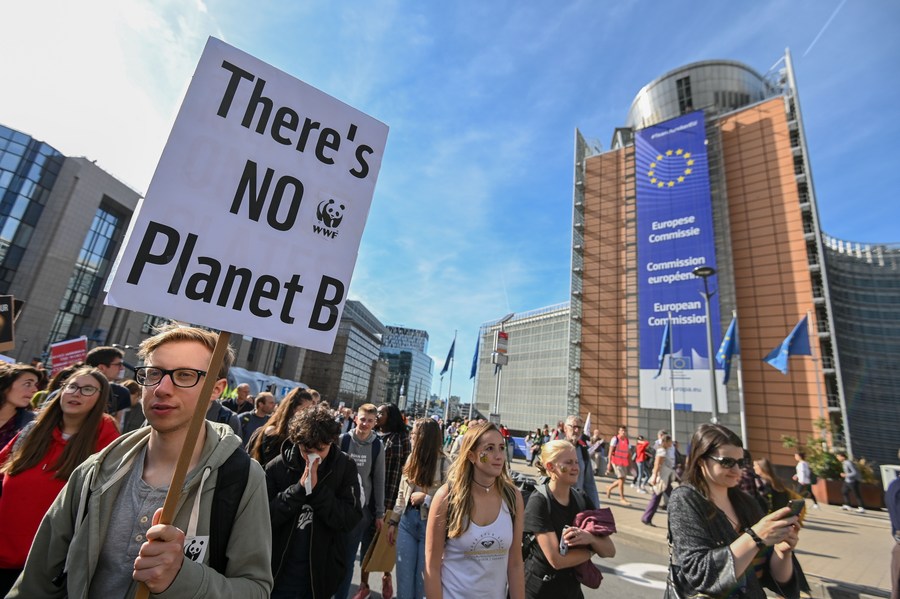U.S. needs consistent policies and multilateral cooperation to patch up its fragile climate effort

Vast as it is, our great ocean has too much to handle. Unwillingly, it acts as garbage bins for humankind, an “inexhaustible” fish pool, and soon, one country’s nuclear waste dumpster. But one of its major roles in the resilient yet fragile global ecosystem is to absorb greenhouse gases (GHG), which it is struggling to do. Nearly half of GHG that can’t be taken up by oceans and the terrestrial biosphere will eventually leak into the atmosphere, trapping and holding heat and consequently causing glaciers to melt and sea levels to rise.
The progressing climate change fueled by mounting greenhouse gases constitutes a looming crisis that ripples out into nearly every aspect of our lives, ranging from rampant wildfires and extreme weather to coral bleaching and shrinking ice sheets.
With all those visible and invisible tolls the crisis has disproportionately inflicted on everyone, it should come as an enormous relief that US President Joe Biden has decided to reverse his predecessor’s course of inaction, staging a comeback on combating the incessant crisis. But one big question remains: can Biden proceed with his climate push against Republicans’ disapproval, or will he let it descend into another partisan impasse or geopolitical gamble?
Return to the fold
On June 1, 2017, former U.S. President Donald Trump, a long-time climate change skeptic, dramatically declared America’s withdrawal from the 2015 Paris Agreement on climate change mitigation, leaving many nations puzzled and global mitigation efforts shattered.
His excuse was ludicrously straightforward: the “disaster” deal, as he called the agreement, would have “hurt the competitiveness” of the U.S., and put the country “at a permanent disadvantage.”
By letting the U.S. become the first and only country to quit the climate accord, he did, in a sense, “regain” America’s edge in an imaginary “solo” competition. But the billionaire president seemed to have ignored a simple fact: Americans weren’t living under a giant dome, isolated from the rest of the world and immune from climate change-related consequences.

U.S. President Joe Biden delivers his inaugural address after he was sworn in as the 46th President of the United States in Washington, D.C., the United States, on Jan. 20, 2021. (Xinhua/Liu Jie)
1,329 days later, fortunately, President Joe Biden returned the U.S. to the Paris climate accord just hours after his swearing-in, pressing the pause button on his predecessor’s four years of denial and counteraction on climate issues. Nevertheless, as an Obama-era veteran, President Biden knows all too well that signing executive orders with the stroke of a pen is one thing, and turning around American’s skepticism and putting climate actions into effect is another.
A national poll by the Pew Research Center published on April 21, 2020, the 50th Earth Day, showed how divided Americans have become on climate change. “More Democrats and Democratic-leaning independents (85%) think protecting the environment should be a top priority for the president and Congress than do Republicans and GOP leaners (39%),” read the survey, which also highlighted that “Partisanship is a stronger factor in people’s beliefs about climate change than is their level of knowledge and understanding about science.”
Even with a majority in the U.S. Congress, Joe Biden would probably still find it difficult to sell his climate plans. On March 31, President Biden unveiled his ambitious 2 trillion-dollar infrastructure plan, which was heavily focused on climate-related infrastructures such as clean energies. Senate Minority Leader Mitch McConnell, however, slammed Biden’s plan on the same day, saying he was “not likely” to support the proposal, while Senator Ted Cruz denounced it as “the Green New Deal-lite masquerading as an infrastructure plan.”
Especially in states like Texas, which had just been hit hard by a power crisis back in February, lawmakers and politicians are downplaying the role climate change plays in natural disasters such as unprecedented winter storms while scapegoating renewable energies for a disastrous power-out.
Even if Joe Biden can secure his infrastructure proposals and take action on the climate during his tenure, it is no safe bet that three or seven years down the line his successors won’t change course. Robert N. Stavins, a Harvard environmental economist, put it very accurately: “Something countries of the world are very familiar with is this whiplash of going from a Republican to a Democratic to a Republican administration… That goes to the heart of the long-term credibility."

Not a bilateral race
In promoting its climate proposals, the Biden administration is pulling the “China card” in the hope of reaching an unlikely bipartisan consensus and gaining support from America’s allies at large.
According to Politico, Joe Biden described his climate-focused $2 trillion infrastructure plan as a way to “promote our national security interests and put us in a position to win the global competition with China in the upcoming years.”
US Secretary of State Antony Blinken also remarked ahead of the White House climate summit that the U.S. is “falling behind” in the green economy, noting that “it’s difficult to imagine the United States winning the long-term strategic competition with China if we cannot lead the renewable energy revolution,” according to the Financial Times.
Indeed, the upgrading to renewable energy could evolve into a full-blown global revolution while meeting targets set in the Paris agreement--limiting global warming to well below 2, preferably to 1.5 degrees Celsius, compared to pre-industrial levels--is supposed to be a race. The only problem is that it is not a zero-sum, two-person revolution, nor is it an arsenal-piling, win-lose race.

People participate in a march calling for action against climate change in Brussels, Belgium, Sept. 20, 2019. (Photo by Riccardo Pareggiani/Xinhua)
Living under the same sky and breathing the same air, one should become aware that one nation’s failure (in combating the climate crisis) is every nation’s failure, and the success of humankind’s climate mission won’t be guaranteed if one of the world’s largest emitters keeps flip-flopping on its climate policies. Instead of applying its trademark zero-sum mentality to a crisis we are all in together, the U.S. should formulate consistent climate policies and join hands with major countries to address the climate crisis that is underway.
The cracking and melting of ice shelves might be irreversible, but luckily, the melting confidence in America’s credibility on climate issues and the cracking prospects of the global climate mission can still be restored.
On April 22, US President Joe Biden convened a virtual Earth Day summit, in which he outlined an ambitious goal to sharply reduce the country’s greenhouse gas emissions. Chinese President Xi Jinping also delivered a speech via a video link at the summit to showcase China’s resolve to address the global crisis.

Aerial photo taken on Aug 19, 2020 shows wind turbines in Jiucaiping scenic spot in Southwest China's Guizhou province. [Photo/Xinhua]
“Faced with unprecedented challenges in global environmental governance, the international community needs to come up with unprecedented ambition and action. We need to act with a sense of responsibility and unity, and work together to foster a community of life for man and Nature,” Xi remarked. Citing the recent China-U.S. climate talks, at the end of which a joint statement was issued, Xi also stressed that “China welcomes the United States' return to the multilateral climate governance process", and the country "looks forward to working with the international community including the United States to jointly advance global environmental governance.”
But in working together, the U.S. and its allies in the developed world should also be aware of the disproportionate onus they intend to put on developing countries on climate issues. Developed countries, which benefited tremendously from the industrial revolution from an early stage and have much higher per capita carbon emissions, should not put undue pressure on the developing nations, which have just lifted all its people out of poverty, or, like many Least Developed Countries (LDCs), still have trouble meeting the basic needs of their citizens. Just as President Xi put it, “the principle of common but differentiated responsibilities is the cornerstone of global climate governance,” and developed countries need to “help developing countries strengthen their capacity and resilience against climate change”.
Back in 2014, then US President Barack Obama said in a tweet that “we are the first generation to feel the effect of climate change and the last generation who can do something about it.” After three years of partisan battle on the issue and a four-year vacuum, his former colleague will carry his torch to do something about the crisis. It won’t be easy. And Joe Biden should not squander this once-in-a-lifetime opportunity, but should dare to pursue consistent climate policies and seek multilateral cooperation to patch up America’s climate effort.

People take part in a climate change protest in Times Square in New York, the United States, on Sept. 20, 2020. (Xinhua/Wang Ying)
Photos
Related Stories
- Commentary: China's climate ambition and action
- Developed countries urged to honor commitment on climate change assistance
- China will "overachieve" its goal on carbon emission: Al Gore
- EU leaders seek to lead climate action in carbon trading
- UN chief calls on developed countries to contribute more to tackling climate change
Copyright © 2021 People's Daily Online. All Rights Reserved.










